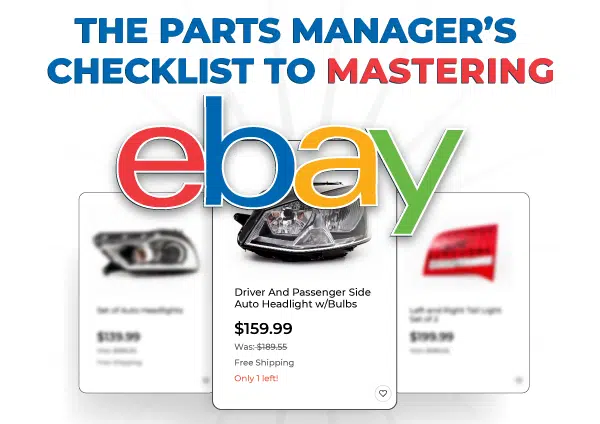You’re ready to take your dealership to the next level and grow your parts business online. It’s now time to establish your eCommerce strategy with your parts manager. This might seem like a daunting task, but with the right steps, you can create a robust strategy that produces results.
Create A Competitor Analysis
Before you start implementing new software, tools, and tactics for your dealership’s strategy, you need to understand the current state of the eCommerce market. The best place to start is by creating a competitor analysis. Competitor analysis gives you an overview of what your competitors are doing successfully and the areas in which you can outmatch them.
A competitor analysis can include many things, but here are three barebones elements you should have in yours.
Identify Your Top Five Competitors
To get a better understanding of the market, you should make a list of at least five competitors. Five is a good minimum number to get a scope of where you stand in the market, but ideally, a strong competitor analysis will include between eight and ten competitors. This list should include both direct competitors and indirect competitors.
Direct competitors can include other dealerships or franchised parts stores in your local area that sell online, whereas indirect competitors can include third-party marketplace stores and individual retailers.
Look At What They’re Doing
Look at everything that they’re doing with their online presence. How many of them do certain things very well? How many of them have pitfalls that you can improve and outmatch at your dealership?
Are their websites easy to use? Do they have a strong social media presence? Do they have a high quantity of customer reviews and testimonials?
If you can identify the elements they do well, and the ones they don’t do well, you can better tailor your strategy to focus on those key elements.
Run a Domain Authority Analysis
You can’t have an effective eCommerce strategy without knowing how well your website (or websites) need to perform.
Run a domain authority analysis on your website. Look at your domain ranking, your SEO ranking across your site, and compare those findings with your competitors. This will help you set an attainable goal to improve that score. If you don’t have a designated website for your parts department yet, still run an analysis on your competitors’ websites to give you a solid baseline.
Determine Three Areas of Most Weakness
Now that you know what your competitors are doing, it’s time to look inward. Where are the areas you need to improve the most to meet your goals and match or outperform your competitors? Look at the three areas of the most weakness in your current strategy.
You’re likely going to have more than three areas that need improvements, but your major three areas will expand beyond their reach.
For example, one of your major areas in need of improvement might be your response time to customer service emails. It takes too long for your team to get back to customers over email or even by phone. However, if you take a look at your whole customer service experience, you may find that your customers are leaving poor feedback or not leaving feedback at all. All of these might prompt you to look at implementing customer relationship management (CRM) software.
This is an excellent example of focusing on smaller processes that contribute to the larger pillar. Look at what processes aren’t working well or are keeping your parts department from running smoothly.
Identify Your Primary Goals
Your overall goal is to implement a strong eCommerce strategy, that’s true, but what are the smaller, measurable goals that will act as north stars for your parts department to work toward? Setting your primary goals now will help you determine what tools and processes you need to implement to reach them.
Break them down into specific areas. Let’s say you have three major goals for your parts department. One of them is to increase sales by 25%. One is to increase online customer reviews from 75 to 150. The last is to decrease your obsolescence rate by 30%.
These are specific goals that tie back to the major processes that need fixing in your parts department. You can determine that to achieve these goals; you need tools to help you sell more obsolete inventory, incentivize customers to leave online reviews, and find ways to improve profitability for parts you sell online.
Determine The Tools You Need to Achieve Them
Once you’ve set your goals, you and your parts manager can get down to fine-tuning your list of needed eCommerce items. This is the most important step in the process. During this step, you and your parts manager need to create a list of eCommerce software tools to help implement and streamline your overall strategy.
How are you supposed to know what tools you need? Look back at your main goals and your current processes. What isn’t working for you right now?
You might determine after reviewing those two steps you need an email marketing campaign tool to meet your customer acquisition goals or that you need to add an additional selling channel on top of your website to meet your sales goals.
Once you know exactly the kinds of tools and resources you need, you can budget out how much money and time it will cost you to use them. Can these tools be easily integrated into your existing sales model? How much time needs to be spent learning how to use these new tools? Be honest.
Create New SOPs to Support
Now that you’ve done all of this, it’s time to get down to the nitty-gritty. Before any successful plan can be implemented, you need to be able to teach your staff how to use these new tools. You and your parts manager need to create standard operating procedures (SOPs) that are easy to understand.
Run through some initial training with parts department staff to help them get familiarized with them. Make adjustments to your SOPs to ensure that they accurately reflect the day-to-day workings of your parts department. Once you’ve got them finalized, test your staff and make sure they can teach others how to use these tools. If they can’t teach it, they haven’t learned it.
Don’t Let eCommerce Scare You
Embracing eCommerce need not be an intimidating endeavor. With careful planning, a deep understanding of your existing process gaps, and the adoption of the right tools and strategies, you can drive significant success through online parts sales.
However, if the task of setting up your own eCommerce strategy seems daunting, remember that you don’t have to go it alone. Our team at RevolutionParts has the expertise and resources you need. We specialize in simplifying the process of getting started and setting up your online parts business, offering you access to the necessary tools and unparalleled support to ensure your success.
So, are you ready to take your parts department to the next level with a winning eCommerce strategy, but need some guidance on the specifics? Don’t hesitate—contact an eCommerce expert at RevolutionParts today. We’re here to turn the complex into the straightforward, paving the way for your dealership’s online success. Click the button below to talk to an eCommerce expert.




